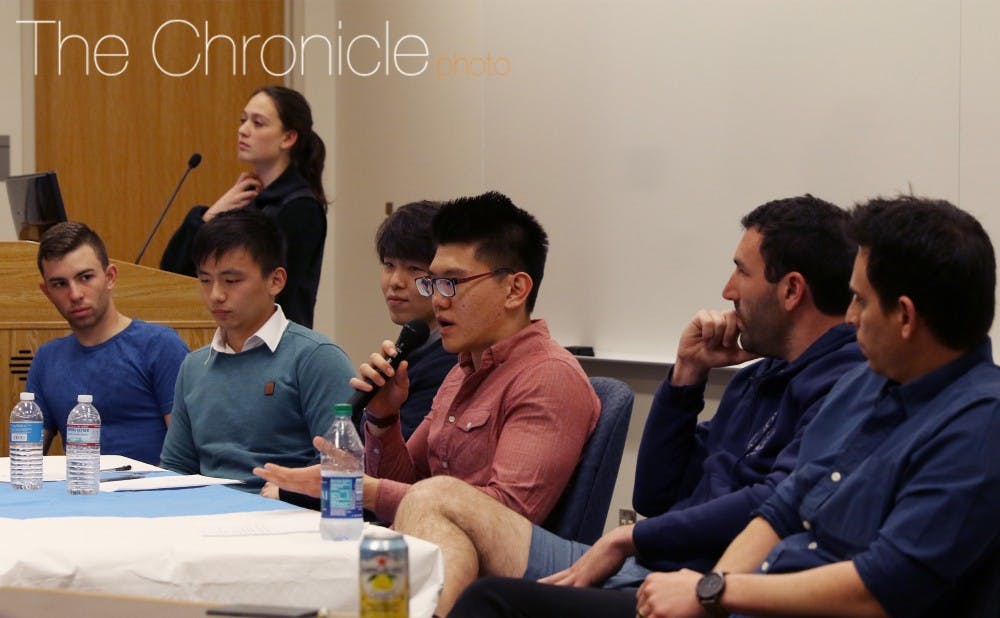Most students arrive at Duke for their first year as teenagers fresh out of high school—but others, who come from countries with mandatory military service, arrive with unique experiences under their belts.
As part of Israel Week at Duke, the Duke Israel Public Affairs Committee held a panel discussion Monday night featuring five Duke students who have previously served in the military and one current Duke Army ROTC member. Sophomore Isabel Aptman, president of DIPAC, said the purpose of the event was to share various perspectives that come with military service and provide a more humanizing view of the Israel Defense Forces.
Three primary threads emerged from the discussion—the overarching sense of priorities students developed after undergoing military service, the challenges that the panelists faced while serving and whether they would do it all again.
Junior Eddie Torgas, a Duke Army ROTC member, said that while participating in a special combat diver course this summer, he was put underwater until he passed out—an experience he now uses to contextualize other seemingly important events.
“Things like stress and pain are very, very different from what I thought it was. I thought that having to turn in an assignment late was the end of the world—that certainly changed when I was put underwater to the point of passing out,” he said. “I realized that having to breathe is a little more important than getting that assignment in on time."
Elad Shani, an MBA candidate at the Fuqua School of Business, served three years in the Israeli Defense Force before being released because of an injury. Israel mandates three years of military service for men after they turn 18.
The 32-year-old said his military service allowed him to become his own person and gain a broader perspective. He questioned whether things like grades and jobs matter as much as seem to for other students.
“I have friends who don’t even get to experience job interviews because they died 10 years ago in the military,” Shani said. “It has shaped me and how I carry myself as a student.”
Asaf Kanari, a graduate student at Fuqua who also served in the IDF, said that his time in the military taught him to enjoy the little things in life. He described a night when he had been in an operation for two to three hours, then went into the city of Tel Aviv the next day with a friend and ate hummus at a restaurant. What would have normally been a routine occurrence felt like the best thing in the world because he had been so close to losing his life only hours before.
C.J. Lim, who served for three years in the Singapore Armed Forces, said that being older than his peers has impacted his Duke experience. While others may prioritize drinking or hanging out with friends, Lim said he puts a high priority on sleep because he went without it so much while in the military. He recounted a time when he went three days without sleep while in a trench, before beginning to hallucinate.
Torgas concurred with Lim on the importance of sleep, and explained how that has factored into his time at Duke. Going through training is particularly difficult because he is held to the same standards as other students while balancing his military training with academics, he explained.
He said he returns from training at 7:30 a.m. on most days, and is already tired and starting his day before most of his classmates have even woken up.
“Yesterday, I had to chew the coffee powder out of my MRE. You’re supposed to put it in water, but I had to chew it because while I was in security with my face on the buttstock of a rifle looking down the scope, I fell asleep,” Torgas said. “I was sitting up, and I just fell asleep on my rifle.”
Despite the difficulties that accompany military service, several of the panelists said that they would be willing do it again.
Shani noted that his daughter was born seven months ago here in the U.S., but that if she is privileged enough to hold dual-citizenship, she needs to experience the service. He explained that he strongly sees himself as an Israeli and that he would gladly do his service again.
"From the way I look at it, this is something she has to do—because of our history, because of our heritage. My dad’s entire family was killed in the Holocaust," Shani said. "So for me, it's very much connected."
Get The Chronicle straight to your inbox
Signup for our weekly newsletter. Cancel at any time.
Bre is a senior political science major from South Carolina, and she is the current video editor, special projects editor and recruitment chair for The Chronicle. She is also an associate photography editor and an investigations editor. Previously, she was the editor-in-chief and local and national news department head.
Twitter: @brebradham
Email: breanna.bradham@duke.edu

